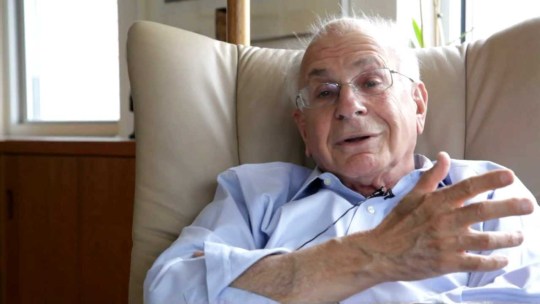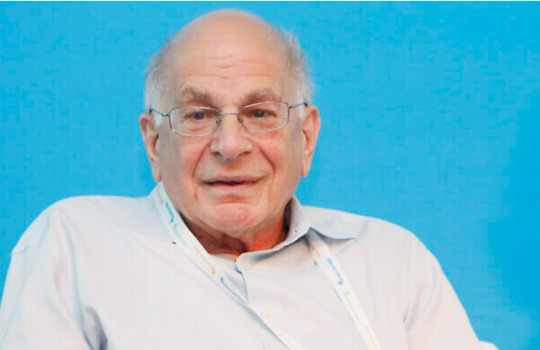#kahneman
Explore tagged Tumblr posts
Text
È morto a 90 anni lo psicologo Daniel Kahneman, fra i più importanti esponenti dell’economia comportamentale moderna
Leggi tutto:
0 notes
Text


F. Scott Fitzgerald // Daniel Kahneman
#daniel kahneman#F. Scott Fitzgerald#the great gatsby#quotes#dark academia#chaotic academia#classic literature#poetry#classic academia#light academia#books#memories
6K notes
·
View notes
Text
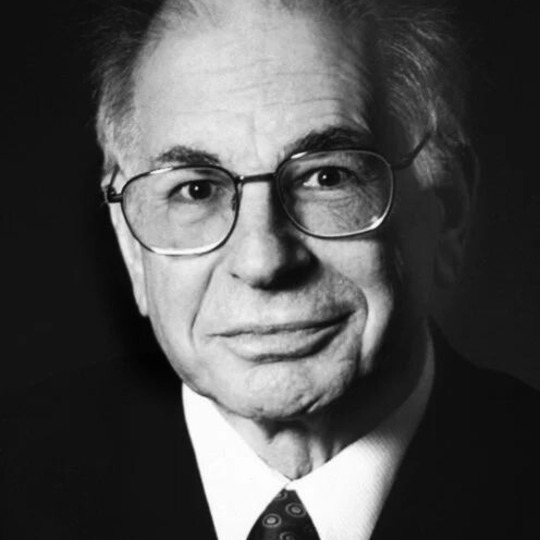
“People who make a difference do not die alone. Something dies in everyone who was affected by them.”
— Daniel Kahneman
#daniel kahneman#literature#lit#literature lover#literature quote#literature quotes#philosophy#philosophical#philosopher#philosophers#philosophy of life#philosophy quote#philosophy quotes#quote#quotes#excerpts#excerpt#quoteoftheday#booklover#book#bookworm#books#booklr#book quotes#book quotations
84 notes
·
View notes
Text
Classroom Articles

The Back Drawer Effect of Perception
To interpret and understand the data that our mind receives—perception—is one of the trickiest and most natural qualities of human cognition. As Immanuel Kant argued, our perceptions actively shape our external reality rather than merely reflecting it.
Research suggests that the human brain generates between 6,000 to 70,000 thoughts per day. Astonishingly, 80-90% of these thoughts are repetitions of "yesterday's logic", meaning most of what we think today is recycled from the past.
These recurring thoughts influence our beliefs, ethics, choices, and actions, leading us to question: How impactful is our subconscious programming, a.k.a our mental “back drawer”?

The Back Drawer: Subconscious Conditioning
The back drawer consists of stored mental patterns shaped by childhood experiences, social conditioning, and repeated life events.
For instance, if you were frequently told as a child that you’re “not good at math,” your subconscious mind would reinforce this belief, affecting your confidence and effort in the subject. Over time, this internalized belief manifests in real-world struggles, regardless of actual ability.
"Neurons that fire together, wire together."
-Dr. Joe Dispenza
Our brains automate repeated thoughts and behaviors, making change feel difficult and unnatural.
This leads to a self-reinforcing cycle of perception and reality:
Same Thoughts → Same Choices → Same Behaviors → Same Experiences → Same Feelings → Repeated Thoughts
Unless actively interrupted, this cycle continues indefinitely.
"The mind defaults to past patterns unless actively interrupted."
-Daniel Kahneman

The Subjective Nature of Truth
My father once gave me a perspective-changing lesson in elementary school. He said:
"Two people may witness the same event but interpret it in completely different ways."
This happens constantly in society, revealing that perception is shaped by personal experience, emotions, and cognitive biases.
As Friedrich Nietzsche argued:
"There are no facts, only interpretations."
Truth, then, is often subjective. What one person sees as undeniable, another might challenge based on their unique perspective.
(For example, some people argue that Taka—better known as Scar from The Lion King—was driven to villainy because Mufasa stole his ultimate crush. While I disagree, the debate itself shows how perception influences narrative.)

Rewiring Perception & Thought Patterns
To transform perception, one must be open and eager to:
1. Actively Question Core Beliefs
Self-introspection is key. Ask yourself:
What beliefs are limiting me?
Where did they come from?
What evidence do I have to challenge them?
2. Implement a “Delulu” Strategy for Success
("Delulu" = conscious belief in an optimistic, alternative reality until it becomes true.)
"Act as if what you do makes a difference. It does."
-As William James
3. Commit to Repetition & Exploration
New beliefs, thoughts, and actions must be practiced repeatedly to override the subconscious back drawer. Growth is often chaotic, but necessary.
If you grew up believing that money is hard to make, actively seek proof that contradicts this belief.
If you were conditioned to fear failure, intentionally expose yourself to small failures and reframe them as lessons.

Conclusion
The thoughts we hold, consciously or unconsciously, dictate the reality we experience. The mind is a powerful tool—it can either keep us trapped in old patterns or propel us toward transformation.
The question is:
Will you consciously design your reality, or will you let the past decide it for you?
_____
Inspired by:
This post was inspired by the thought-provoking video “Give Me 21 Minutes and You’ll Never Suffer Again – You’re Stuck on a Loop”. The video explores the power of subconscious programs, repeated thought patterns, and how they shape our reality. It offers deep insights into how our minds can be reprogrammed for transformation.
🎥 Watch it here:
youtube
#trc magazine#learning#classroom articles#understanding#human nature#perception#mindset#subconscious#thought patterns#self awereness#psychology#neuroscience#habits#immanuel kant#friedrich nietzsche#william james#daniel kahneman#joe dispenza#cognitive bias#philosophy of mind#habit loop#delulu strategy#delulu mindset#mental transformation#self discovery#repetitio effect#reality creation#Youtube
3 notes
·
View notes
Text
Dall’analisi di oltre 450.000 risposte al Gallup Healthways Well-Being Index, un sondaggio quotidiano condotto su 1000 americani, emerge una risposta sorprendentemente netta al quesito più frequente della ricerca sul benessere: il denaro dà la felicità?9 La conclusione è che essere poveri rende infelici e che essere ricchi forse aumenta la soddisfazione per la qualità della propria vita, ma non migliora (in media) il benessere esperito. La grave indigenza amplifica gli effetti esperiti di altre disgrazie della vita; in particolare, la malattia fa molto più male agli indigenti che a chi dispone di maggior benessere economico. Il mal di testa incrementa la percentuale di quelli che riferiscono di provare tristezza e ansia, portandola dal 19 al 38 per cento nei soggetti appartenenti ai due terzi superiori della distribuzione del reddito. Le corrispondenti percentuali per il decimo della popolazione appartenente alle fasce di reddito più basso sono 38 e 70 per cento, un livello più alto nelle condizioni di base e un aumento molto più grande. Si osservano notevoli differenze tra i molto poveri e il resto della popolazione quando si vanno ad analizzare gli effetti del divorzio e della solitudine. Inoltre, gli effetti benefici del weekend sul benessere esperito sono assai inferiori tra i molto poveri che nella maggior parte delle altre persone. Il livello di appagamento oltre il quale il benessere esperito non aumenta più risulta essere un reddito familiare di circa 75.000 dollari nelle aree ad alto costo della vita (era inferiore in aree con un costo della vita più basso). L’aumento medio di benessere esperito associato a un reddito superiore a quello era assolutamente nullo. È curioso, perché un reddito maggiore permette indubbiamente di procurarsi molte cose che danno piacere, come vacanze in posti interessanti e biglietti per l’opera, nonché un migliore ambiente in cui vivere. Perché questi piaceri aggiuntivi non vengono riportati nei rapporti sull’esperienza emozionale? Un’interpretazione plausibile è che un reddito maggiore sia associato a una ridotta capacità di godersi i piccoli piaceri della vita. Alcune prove fanno pensare che questa ipotesi sia corretta: stimolare gli studenti con l’idea della ricchezza riduce il piacere che il loro volto esprime quando mangiano una tavoletta di cioccolato!
Daniel Kahneman - Pensieri lenti e veloci
5 notes
·
View notes
Text
Kahneman once said that being wrong feels good, that it gives the pleasure of a sense of motion: “I used to think something and now I think something else.” He was always wrong, always learning, always going somewhere new."
— Daniel Engber, from "Daniel Kahneman Wanted You to Realize How Wrong You Are." The late psychologist gave the world an extraordinary gift: admitting his mistakes. (The Atlantic, March 27, 2024)
#Daniel Engber#daniel kahneman#wrong#mistake#new#change#psychology#motion#move#learn#grow#personal development
11 notes
·
View notes
Text

Niente nella vita è tanto importante quanto pensiamo che lo sia nel momento in cui lo pensiamo.
Daniel Kahneman
49 notes
·
View notes
Video
youtube
Daniel Kahneman: Thinking Fast vs. Thinking Slow
#daniel kahneman#studying psychology has no effect on people at all#we are story-making creatures#couldn't find a video of his critique of probability
2 notes
·
View notes
Text
Thinking Sloooow: Unlocking Creativity and Depth 💡
Sometimes, the slow and boring things teach us the most.
I’ve been listening to Martin Seligman’s Flourish for over a month now—at times calling it slow or dull. Yet, I keep coming back to it, captivated by its ideas. And then there’s Thinking, Fast and Slow by Daniel Kahneman. I’ve tried to read it twice but only made it to page 50. 🤯 Still, I know mastering these concepts is worth the effort.
Seligman recently shared an insight that hit home: Thinking fast frees up mental space for what truly matters: thinking slow.
Deep, deliberate thinking helps us make better decisions, explore creativity, and avoid costly errors. It’s a skill worth practicing, and one I’ve been working on for over a decade.
This realization led me back to Kahneman and the famous idea of our two minds—one fast, one slow—and how they shape our choices.
Ready to explore these ideas? Dive into my latest blog post for practical insights and reflections!
#SuccessMindset #EmberhartJourney #CharacterGirls #LifeOfPurpose #DeepThinking #CreativityUnlocked #SlowDown #ThinkingFastAndSlow #LifeSkills #PersonalGrowth #GirlDad #NewBlog
2 notes
·
View notes
Text
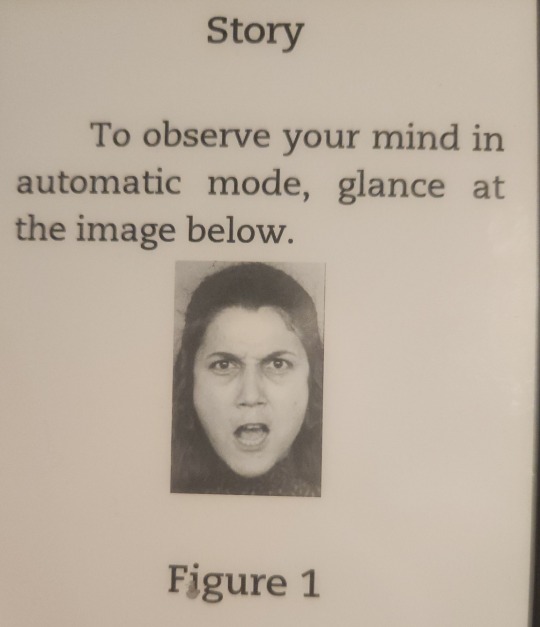
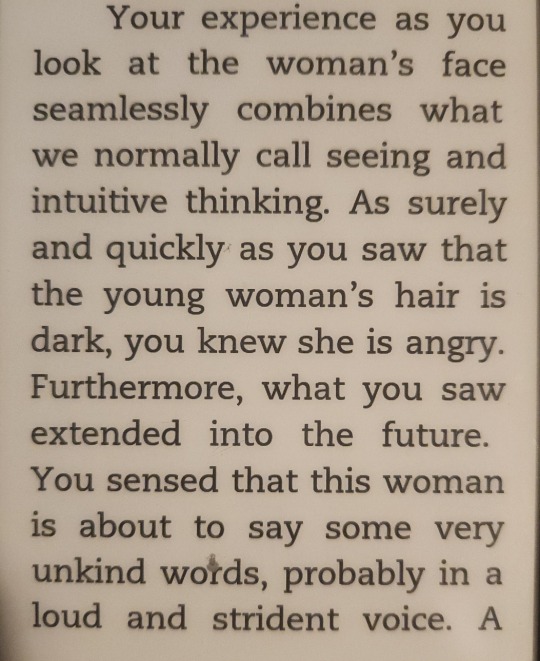
I did not peg her as angry, actually. I would have said "surprised". Definitely wouldn't have assumed she was about to start yelling. To me the author undermined their own point with this example. Maybe this example only works for neurotypicals.
#bookblr#actually neurodivergent#readblr#Daniel Kahneman#Thinking Fast and Slow#Petiolata reads#op#personal#psychology#You might think the issue of NT interpretation vs ND interpretation shouldn't matter here but#I'm specifically reading it to try and better understand how the human brain makes decisions and#if this all only applies to NT people then it's kind of useless to me for that purpose 🙃#*learning for the purpose of helping myself with decision-making I mean#honestly it should've occurred to me that this would be an issue since there's so much difference in executive function and impulsivity#between NTs and NDs#as well as all kinds of other factors as well
4 notes
·
View notes
Text
Book of the Day -
Today’s Book of the Day is Thinking, Fast and Slow, written by Daniel Kahneman in 2013 and published by Farrar, Straus and Giroux. Daniel Kahneman is an Israeli-American psychologist whose main research topics have been the psychology of judgment and decision-making, and behavioural economics, for which he was awarded the 2002 Nobel Memorial Prize in Economic Sciences (shared with Vernon L.…
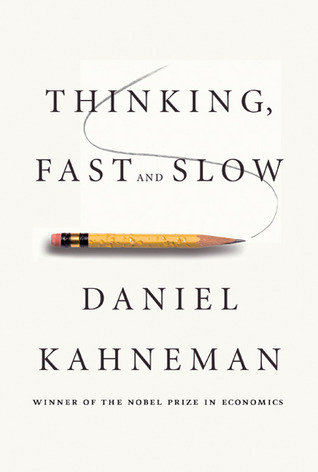
View On WordPress
#availability heuristic#behavioural economics#behavioural psychology#Book Of The Day#book recommendation#book review#bookstagram#booktok#cognitive bias#cognitive science#Daniel Kahneman#decision-making#Economics#endowment effect#loss aversion#Neuroscience#prospect theory#Psychology#Raffaello Palandri
15 notes
·
View notes
Text
daniel kahneman died. someone do a cartoon, kahneman goes to heaven, amos tversky's there: "hey danny, i've got an idea for a paper"
#daniel kahneman#the tversky funeral scene in The Undoing Project rekt me#thats some shakespeare shit
2 notes
·
View notes
Text
I came across the idea of a "cortical-thalamic pause" in an old novel. The idea being that we take better, more effective action in our lives when we integrate our emotion centers and our reasoning centers. It was a NOVEL, mind you, but coming across the idea as a kid probably helped my life a lot.
A surprisingly useful summary from Quora :
Thalamus/Thalamic is here used as a shorthand for the lower brain functions, associated with feelings, sensing, pain, pleasure, instincts, bodily functions, etc. Massive sub-conscious parallel processing goes on there and responses are often immediate. Neo-Cortex/Cortical is the shorthand for the higher, more recently developed, brain functions, associated with conscious thinking, reasoning, language use, deliberate decision making, etc. It can do abstract thinking, but can't focus on more than a couple of things at the same time.
We easily get in trouble when we mix the two. Our ability to abstract is rather new and apparently a bit faulty. The cortex might construct a "meaning" for some lower level sensations which gives rise to faulty decisions. The thalamic system might launch instant action based on what was sketchy reasoning in the cortex. E.g. killing somebody because they have the wrong religious belief. The idea of the pause is basically to be conscious of the link between one's reactions and one's reasoning, and to make sure they're in sync. It doesn't have to be a literal pause in time, but it could be. It is an equivalent of "count to ten before you...".
If you were about to take impulsive physical action, the pause would allow you to think through the logic and implications of what you were about to do. The other way around, if you thought you just arrived at a logical, well reasoned conclusion, a semantic pause would allow you to notice what you actually feel about it, what your instincts tell you. Does it feel right? Does it work?
The primary ingredient is consciousness. Pay attention. Be aware. Examine everything that is there, including your own thoughts, your premises, your feelings, what you perceive. -- There are certain tools that are helpful. A consciousness of abstraction is vital. Simply being aware that there are many levels of abstraction between what really is there and what you put into words and thoughts. Not just being aware of that, but specifically examining the transition between a "thing" and its abstraction. At what point do some rays of light become a picture in your brain? At what point do you group it together with other tables you've seen, to identify it as a "table"? At what point does the word "table" lose its connection with the particular image you saw?
The objective is to take decisions and actions that are coherent, congruent and sane at all levels. The cortico-thalamic pause is a system check and a consistency check at and between multiple levels.
Learning to be less reactive is literally saving my life. I’m finally understanding that processing things is not the same as immediately forming a response to them. I can process without feeling pressed to formulate a reaction to what someone said or did or a situation that displeases me. Not that a quick head on your shoulders is necessarily a bad thing, but 9/10 taking a minute to just process could save you so much trouble
#psychology#general semantics#daniel kahneman#thinking fast and slow#a. e. van vogt#null-a#sf#good advice
11K notes
·
View notes
Text
Ai pierdut bani? Află de ce te afectează atât de mult! - Ep. 122 (FINANȚE)
youtube
View On WordPress
#Acțiuni#administrare capital#Aversiunea la pierdere#brokeri#clasele de active#Cătălin D. Iamandi#Cătălin Daniel Iamandi#Daniel Kahneman și Amos Tversky#dezvoltare personala#dividende#domeniu financiar#educatie financiara#ETF#Financial Education#Financial Success#finante personale#Fonduri mutuale#independență financiară#investiții#investiții în acțiuni#investiții în ETF#Investing#investitor#motivatie#R-type Evolution#Richard H. Thaler#risc-randament#România#română#subtirare
1 note
·
View note

